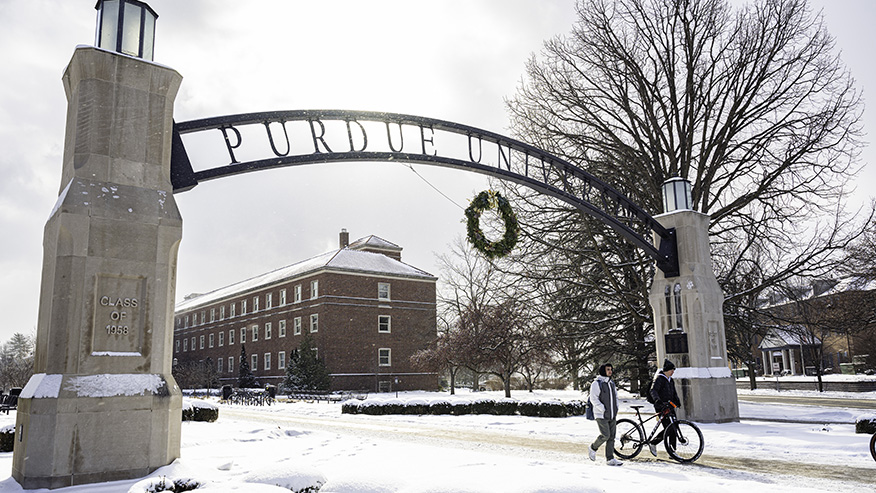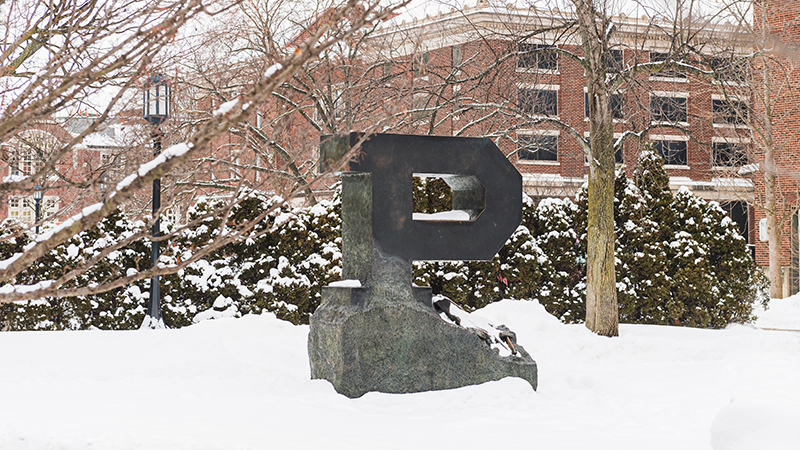Supply chain undergraduate program in Daniels School of Business focuses on putting principles to practice

About this series: This story is part of an ongoing Purdue Today series highlighting programs ranked in the Top 10 or Top 10thpercentile among our peers nationally, demonstrating the university’s persistent pursuit of excellence, innovation and transformative learning.
Mitchell Walbolt found his calling in, of all places, a pizza joint. As a high schooler, Walbolt worked at the Pizza House in his hometown of Cicero, Indiana, where he became interested in the operations aspect of the kitchen.
After starting his academic career in accounting at Purdue’s Mitchell E. Daniels, Jr. School of Business, he switched to the Supply Chain, Information and Analytics program. Following graduation in 2023, he pursued a degree in the Master of Science in Global Supply Management program and expects to graduate in May.
“I chose Purdue because of its STEM and analytics strengths,” Walbolt says. “Then partly because of my experience at the pizza shop, and partly because I was fascinated with the issues that took place during the pandemic, I decided supply chain would be a good area for me to study.”
The Daniels School ranked No. 8 in production/operations management and No. 10 in supply chain management/logistics in the U.S. News & World Report undergraduate rankings last fall. The degree program is now known as Supply Chain and Operations Management (SCOM), a change made in 2022 to focus on better understanding of the supply chain process.
Additional information
Olga Senicheva, clinical assistant professor of management and academic director of the undergraduate SCOM program, says experiential learning is the key ingredient. “Every course has a project attached to it,” Senicheva says. “It’s important for the students to be able to take what they learn in the classroom and immediately apply it to a real-world situation.”
Corporate partners for course projects include PepsiCo and Indiana-based semitrailer manufacturer Wabash. But for some projects, such as those taught by Senicheva, students must be entrepreneurial and find a local company with which to work, applying not only their technical expertise but social skills as well.
Senicheva says the result is that students ask great questions, both of her and their industry partners. Students also visit local companies to observe logistics operations in real time and network with practitioners to get advice as well as seek internships.
Walbolt has taken advantage of his time at Purdue to intern at several companies. He spent a summer working in operations for GEODIS, focusing on third-party logistics; another at Caterpillar, analyzing supplier performance. Last summer, he was at Tesla in Palo Alto, California, where he globally sourced $8.5 million of PCBAs, or printed circuit board assemblies.
“I really liked Tesla. They’re still a young company that acts like a startup, and their employees are some of the most intelligent people in the world,” says Walbolt, whose favorite class at Purdue was Strategic Sourcing and Procurement with professor Zhan Pang.
A third-generation Boilermaker who earned his undergraduate degree in three years, Walbolt admits part of his reason to pursue a master’s degree is his love of Purdue sports. A regular in the Paint Crew, he never missed a football or basketball game in his time on campus. He also served as a Daniels School Ambassador and was co-director of Old Masters.
Senicheva says students such as Walbolt, who have strong quantitative and analytical skills, are perfect fits for the SCOM program. She adds that women also tend to succeed in the program.
“Supply chain is a broad concept that covers many areas, and it’s largely about coordination and building relationships,” Senicheva says. “Women seem to have a natural ability to do that, and they’re very good at negotiation. It’s a great field to enter.”
Writer: Tim Newton, tnewton@purdue.edu



